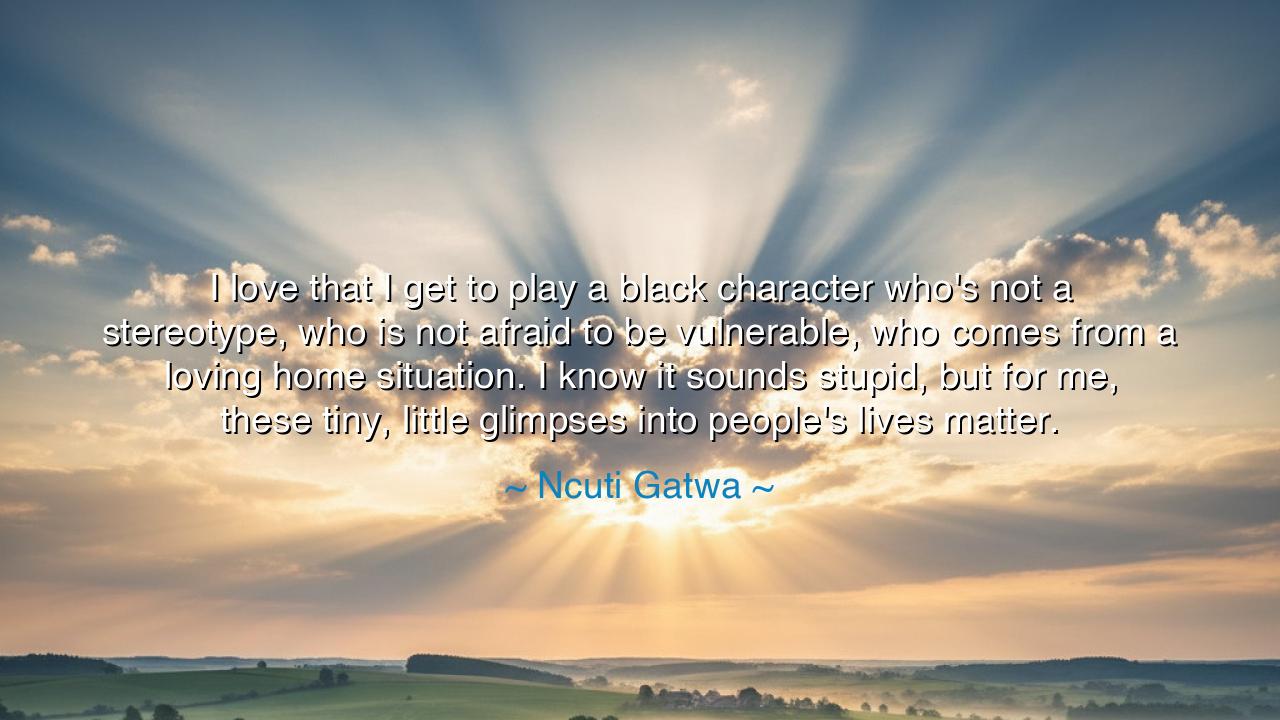
I love that I get to play a black character who's not a
I love that I get to play a black character who's not a stereotype, who is not afraid to be vulnerable, who comes from a loving home situation. I know it sounds stupid, but for me, these tiny, little glimpses into people's lives matter.






In the theaters of our age, where light carves faces out of darkness, a young voice speaks with gratitude and resolve: “I love that I get to play a black character who’s not a stereotype, who is not afraid to be vulnerable, who comes from a loving home situation. I know it sounds stupid, but for me, these tiny, little glimpses into people’s lives matter.” Hear how every clause is a lantern set along a pilgrim road. The speaker, Ncuti Gatwa, rejoices not merely in performance but in restoration—the slow unweaving of a shroud that has long hidden full human faces. He blesses detail, tenderness, and ordinariness as sacred ground, because on that ground dignity takes root.
To name a black character beyond stereotype is to undo old spells. For ages, narrow masks were nailed onto living stories—comic relief, threat, sidekick, sainted sufferer—so that audiences might be comforted by what they already thought they knew. Against these wooden faces, the actor raises a mirror that reflects breath: fear and courage mingled, mistakes and mercy entwined. This is why vulnerable matters. Vulnerability is not weakness; it is proof of depth. It shows a soul with rooms—grief, wonder, shame, joy—rather than a cardboard cutout that casts only one shadow.
The blessing of a loving home is likewise a quiet revolution. Too often, drama has plucked its heat from broken nests, as though love were too soft to carry a plot. But love is not softness; it is architecture. A character who has been gently held can still be wounded, tempted, and transformed—only now we learn how goodness equips a person to meet the world. To show a kitchen where laughter rises like steam, a father who listens, a mother who is not only weary but wise—these images repair the audience’s map of what is possible.
Consider a tale from a small stage. A playwright set a dinner table on which nothing sensational occurred: plantains fried, homework checked, a sibling squabble mended by a corny joke. The critics asked, “Where is the conflict?” The audience—many of them from families seldom shown whole—answered with tears. In the gentle comedy of everyday steadiness, they saw themselves restored to the realm of the believable. Those tiny, little glimpses did not shout; they accumulated like dew until the landscape shone. Such is the power of attention: it turns the ordinary into evidence that people’s lives matter.
History gives us an earlier echo. When Zora Neale Hurston wrote of Eatonville’s porches—of gossip, work songs, flirtations, and thunderheads—she was accused by some of lacking protest. Yet her pages quietly toppled a thousand lies by depicting a community thick with flavor and agency. Likewise Augusta Savage, in clay, gave us Black faces not as symbols but as persons, their eyes carrying weather. Each committed the same defiant act: to insist that detail itself is a form of justice.
From this, a charge to the makers: reject the convenient shorthand of stereotype; let specificity be your rebellion. Write the scene where the hero hesitates, the joke that reveals gentleness, the argument that ends with “I’m sorry” and not with blood. Cast for interiority, not merely for optics. Treat backstory as a birthright, not a luxury. And to the watchers: honor stories that choose nuance over spectacle. Reward the work that invites you to see instead of stare.
Let the counsel be plain. If you tell stories, keep a notebook of glimpses—smells, rituals, pet names, the way grief folds laundry. If you act, protect your character’s softness; do not trade it for easy power. If you greenlight projects, ask: where, in this script, does a life become particular? Where does a black character get to be contradictory, funny, clumsy, brilliant, and vulnerable without carrying the weight of proving a thesis? Finally, in your own circle, practice this art of attention: learn the cuisines of your neighbors, the holidays of your friends, the fears they hide in plain sight. For when the small is honored, the false vastness of prejudice shrinks; and when the ordinary is witnessed with care, a people stands up in full height. These tiny, little glimpses—kept faithfully—are how we rebuild a world in which every face can breathe.






AAdministratorAdministrator
Welcome, honored guests. Please leave a comment, we will respond soon